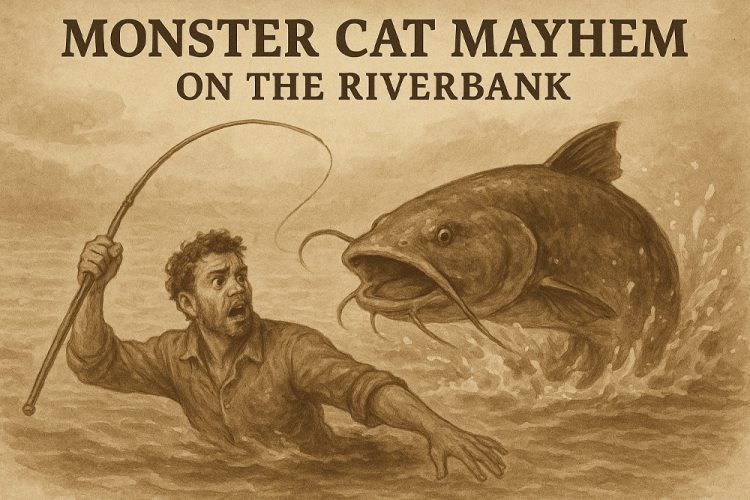A Monster Catfish Encounter
From “Wild Western Scenes” by J.B. Jones (1875)
This month’s “Monster Cats” theme takes us back 150 years to the western frontier, where fishing trips could turn into life-and-death struggles. In this excerpt from his 1875 book “Wild Western Scenes,” John Beauchamp Jones tells how one man hooked and was nearly hauled under by a catfish of legendary size.
John Beauchamp Jones (1810–1866) was a Baltimore-born journalist, editor and novelist who grew up in Kentucky and Missouri. During the Civil War he served as a Confederate government clerk, leaving behind a detailed diary of wartime life. His book “Wild Western Scenes: a narrative of adventures in the western wilderness” blends fictional characters with frontier adventures drawn from observation and oral history, capturing the rough humor, danger and drama of the American West.
One chapter tells of Joe, a fisherman whose confidence outweighed his caution.
“I’ve got a bite!” exclaimed Joe, bending over the verge of the bank and stretching his arms as far as possible over the water, while his line moved about in various directions, indicating truly that a fish had taken the hook.
“Hold fast to the rod this time, Joe,” remarked Glenn.
“Won’t I? It’s tied fast to my wrist.”
Joe gave a violent jerk. The hook bit, and the fish erupted to the surface, “splashing the water several feet round in every direction,” then dove hard. When Joe tried to pull it toward shore, the fish bolted.
“I’m trying with all my might,” Joe told Glenn, “but he’s so plaguy strong he won’t come, hang him!”
“He’ll get away if you don’t mind!” continued Glenn, evincing much animation in his tones and gestures.
“I’ll be drenched if he does!” said Joe, with his arm— to which the rod was lashed—stretched out, while he endeavored to plant his feet firmly in the sand.
“He’ll have you in the water. Cut the rod loose from your wrist!” cried Glenn, as Joe’s foothold gave way and he was truly drawn into the water.
“Oh, good gracious! I’ve got no knife! Give me your hand! Help me! Oh, St. Peter!”
Dragged chin-deep, then under, Joe surfaced “some 40 paces out in the current” and kept his head up with his free arm. The fish, trying to run upstream, soon tired.
“Now for it, Joe. Swim towards the shore with him!” cried Glenn.
“I’ll die, but I’ll have him now—after such a ducking as this!”
At last Joe reached shallow water. Behind him floated “the immense catfish … about the length and weight of Joe, and [with] a mouth of sufficient dimensions to have swallowed a man’s head.” It took both men to haul it ashore.
“I suppose you have now had enough of the fish?” remarked Glenn.
“I’ll acknowledge that I’m satisfied for the present; but I was resolved to have satisfaction,” Joe exclaimed.
It’s a story that could have ended with Joe as the catch instead of the catfish—a true “Monster Cat” yarn from an era when a good day’s fishing might mean coming home half-drowned and sore-shouldered but nevertheless victorious.



